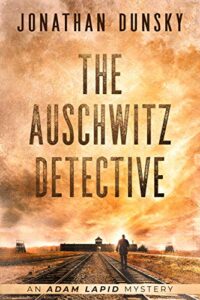By Jonathan Dunsky; reviewed by Jeannette Hartman
 Searching for a murderer in Auschwitz is an idea almost beyond conception.
Searching for a murderer in Auschwitz is an idea almost beyond conception.
Most of the people who arrive at the notorious death camp are murdered within hours. Those who are sent to be slave laborers are governed by thugs and ex-cons who can kill with impunity.
But for former policeman Adam Lapid, the murder of 15-year-old Franz is different. It’s a case of a prisoner murdering a prisoner; a Jew murdering a Jew.
But it’s also a matter of life-and-death for Adam.
Before the war, Adam had been a Hungarian policeman. Now, in Auschwitz, in the crowd milling around the compound, Adam saw and was recognized by a criminal he’d once arrested, Andris Farkas. Adam has no doubt that Farkas will tell someone in the criminal hierarchy running the camp that he is a policeman.
And the worst thing to be in a prison is a cop — unless you are a handsome, blond 15-year-old boy that the Lagerälteste can use for sex as Franz was.
Within two days, the Lagerälteste, or camp prisoner manager, has demanded to see Adam.
After expressing his hatred of cops, the Lagerälteste says, “Normally, I would find great pleasure in killing you. But this is your lucky day, Jew. I need you.”
He offers Adam a deal: Adam has three days to find out who killed Franz and why. He gets no compensation, food or privileges if he succeeds. But if he fails, the Lagerälteste, who has a large appetite for pain and blood, will slowly kill him.
This novel is a police procedural set in the horrifying context of Auschwitz. Readers get a vivid view of life in a death camp, from the ditch-digging that Adam and his best friend Vilmos do; to Kanada, where belongings of new arrivals are sorted and distributed by the Nazis to their own people; to nauseating stench that surrounds the “Mumbler,” a Muselmann who has lost his mind to starvation and exhaustion; to the belching flames, smoke and ash of the crematoria.
What saves this book from being unbearably grim is Adam’s humanity and determination not to give up or compromise to the point where he becomes a criminal himself. As he reminds Vilmos what Jews say at the end of a Passover seder: L’shana haba’ah b’Yerushalayim — Next year in Jerusalem (or maybe Tel Aviv, Adam thinks). The idea that they might meet again in Israel and play a game of chess together is sustaining.
But Adam is also memorizing the faces of Nazi guards and prisoner functionaries to hunt down and kill after the end of the war.
This is a prequel to author Jonathan Dunsky’s Adam Lapid mysteries. All of the other books in the series take place in Israel after the war. Adam fought in the 1948 War of Independence and then became a private investigator in Tel Aviv. Those books are:
- TEN YEARS GONE (2017)
- THE DEAD SISTER (2016),
- THE AUSCHWITZ VIOLINIST (2016)
- A DEBT OF DEATH (2017)
- A DEADLY ACT (2020)
- A DEATH IN JERUSALEM (2022)
- IN THAT SLEEP OF DEATH (2024)
#jonathandunsky. #theauschwitzdetective #jeannettehartman


